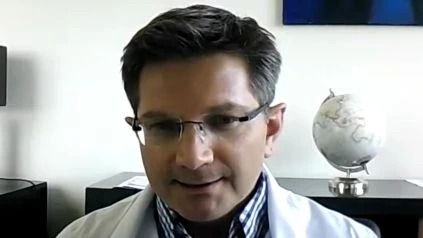Benoit You, MD, Ph.D. from Centre Hospitalier Lyon-Sud discusses an ASCO 2020 abstract entitled ROPHIMMUN phase II trial, cohort A
Context:
Patients with monochemotherapy-resistant gestational trophoblastic tumors (GTT) are treated with historical chemotherapy regimens considered to be productive yet toxic. In all GTT subtypes (Bolze et al. Int J Gynecol Cancer 2017), PD-L1 is expressed constitutively. GTT immune-surveillance includes HLA-G and natural killer ( NK) cells. The monoclonal antibody avelumab (Pfizer & Merck KGaA) anti-PD-L1 causes cytotoxicity via NK cells. TROPHIMMUN study aimed to determine the effectiveness of avelumab in patients with chemoresistant GTT.
Approaches:
In the cohort A of this academic multicenter trial (NCT03135769), monochemotherapy-resistant GTT patients were administered avelumab at 10 mg / kg Q2W. Before hCG normalization, and then for 3 consolidation periods, Avelumab was prescribed. The primary target was the rate of patients with hCG normalization, with a Simon design of 2 phases.
Reviews:
From Dec 2016 to Sept 2019, 15 patients (median 34 years of age) followed by the French Gestational Trophoblastic Center were treated (stage I / III: 53% /47%; FIGO score 0-4: 33%; score 5-6: 47%; score > 6: 20%). With previous methotrexate and 1 patient with actinomycin-D, all had improved. They received a median of 8 cycles of avelumab (range: 2-11). There was beneficial tolerability. 93% of patients developed drug-related grade 1-2 toxicity (86% grade 1), primarily involving fatigue (33%); nausea-vomiting (33%); infusion-related reactions (27%); thyroid dysfunction (20%); dry eyes (20%) & diarrhea (20%). In 1 woman, uterine bleeding grade 3 (treatment unrelated) was observed. The median follow-up period was thirty months. Effective hCG normalizations were achieved in 8 patients (53%, mean of 9 cycles of avelumab), either during treatment with avelumab in 7 patients or after discontinuation with avelumab in 1 patient. None showed relapse afterwards, and 1 patient had a stable pregnancy afterwards. Seven patients (47 percent) who normalized hCG with subsequent actinomycin-D (42 percent) or surgery / polychemotherapy (57 percent) demonstrated avelumab resistance requiring switching to chemotherapy. The probability of avelumab success was not linked to the FIGO score, or the stages of the disease.
Conclusions Therein:
TROPHIMMUN is the first immunotherapy study in patients with GTT. In patients with resistance to mono-chemotherapy, the anti-PD-L1 monoclonal antibody avelumab was successful with a favorable safety profile compared to chemotherapy. Approximately 50 percent of patients may be cured of their diseases that are chemoresistant. The new therapeutic alternative could be Avelumab. Details on clinical trials: NCT03135769.

